With hugs and tearful farewells, hundreds of student activists who have occupied the Legislative Yuan for 24 days walked out of the legislative chamber yesterday into a cheering crowd who gave them a heroes’ welcome.
“Leaving the legislature and retreating from the legislative chamber was a very difficult decision to make, because we know that the expectations, responsibilities and pressures we will face after leaving the legislature will not be lower,” student leader Lin Fei-fan (林飛帆) told the protesters on the legislative floor before asking all protesters to leave the room.
“I would like to stress that leaving here does not mean that we are giving up or backing down. In fact, this movement for democracy that began on March 18 is a continuation of Taiwan’s history of resistance and the quest for freedom that has been ongoing for more than 100 years. We will continue the history and we will never back down or give up,” he added.
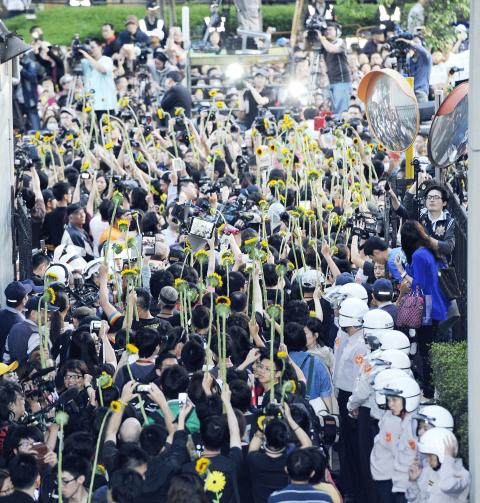
Photo: George Tsorng, Taipei Times
Lin said that after leaving the legislature, he and his partners planned to travel the country to connect with the approximately 500,000 people who took part in a demonstration on Ketagalan Boulevard in front of the Presidential Office Building on March 30.
“The 500,000 people are not just a number, and our next step is to go into different corners of the country to get to know these people,” Lin said. “The campaign is not over yet. We came with dreams in our minds and we leave with responsibilities on our shoulders.”
He also warned that if the Chinese Nationalist Party (KMT) broke the promise by Legislative Speaker Wang Jin-pyng (王金平) — to adopt legislation to monitor cross-strait agreements before reviewing the cross-strait service trade agreement — a bigger protest would be mobilized.
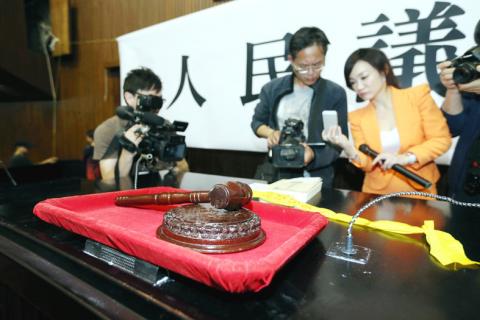
Photo: Chang Chia-ming, Taipei Times
“Occupation of the Legislative Yuan is only the preface to our action, the first chapter will soon start within civil society,” Lin said. “We will be back, we definitely will.”
“We will definitely meet again,” a group of students told each other as they hugged before leaving the legislative chamber, while others were busy cleaning up and restoring the chamber to its original state.
Another student leader, Chen Wei-ting (陳為廷), thanked all those who took part in the movement, regardless of their age, profession or background, while dismissing the media’s naming of the movement as a “student movement.”
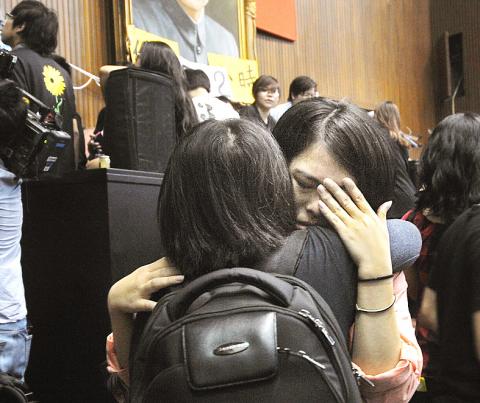
Photo: Fang Pin-chao, Taipei Times
“From the very beginning, this movement has not been a ‘student movement,’ as many people who are not in the movement define it. It is a movement that involves all citizens of this country, as well as many foreign residents living in Taiwan and Taiwanese living overseas,” Chen said.
He thanked medical personnel, lawyers and members of other civic groups, notably the Alliance of Referendum for Taiwan, for their support and help.
While many people made a distinction between protesters at the Legislative Yuan and those who once besieged the Executive Yuan on March 23, Chen said that those activists are also their partners and that the violent crackdown by the police against those people should be remembered.
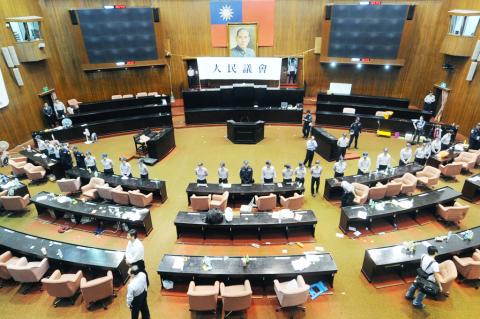
Photo: Lo Pei-der, Taipei Times
Besides clearing all the posters, slogans, banners, medical equipment, food and water from the legislative chamber and removing piles of chairs that blocked the chamber’s entrance, the students also returned the speaker’s gavel and placed it on the table in front of the speaker’s seat before leaving.
“Doing so is a symbolic gesture that we are now returning the legislative chamber to lawmakers,” a student said. “We hope that our lawmakers will, from now on, keep what the people want in their minds while formulating legislation.”
The students also left a classical satirical work, The Bureaucracy Exposed (官場現形記), on the table, with a note urging the legislature to adopt the promised monitoring legislation before reviewing the cross-strait trade pact and refrain from listening to President Ma Ying-jeou (馬英九), but listen to the public instead.
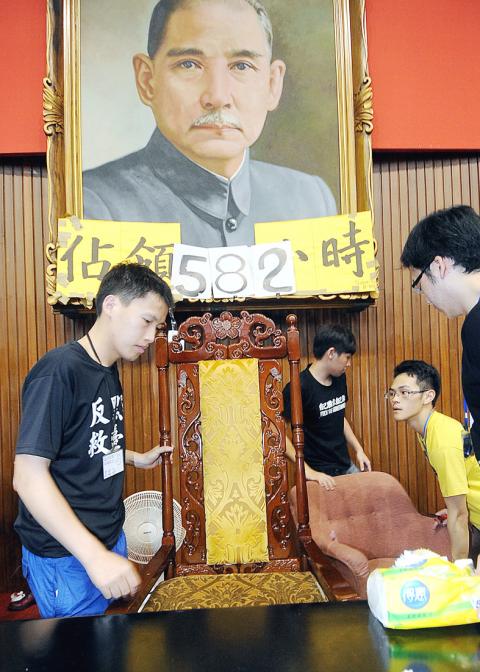
Photo: Fang Pin-chao, Taipei Times
Originally scheduled to deliver a speech, Lin and Chen left the rally before it ended at about 8:30pm.
After the rally, some still refused to leave, and as of press time, several civic groups, including the Alliance of Referendum for Taiwan, were still rallying outside the legislature, saying that they would wait to be evicted by police.
Meanwhile, shortly after the students’ departure from the Legislative Yuan, the National Police Agency ordered forensic investigators from the Taipei City Police Department’s Forensic Science Center to collect fingerprints from the legislative chamber.
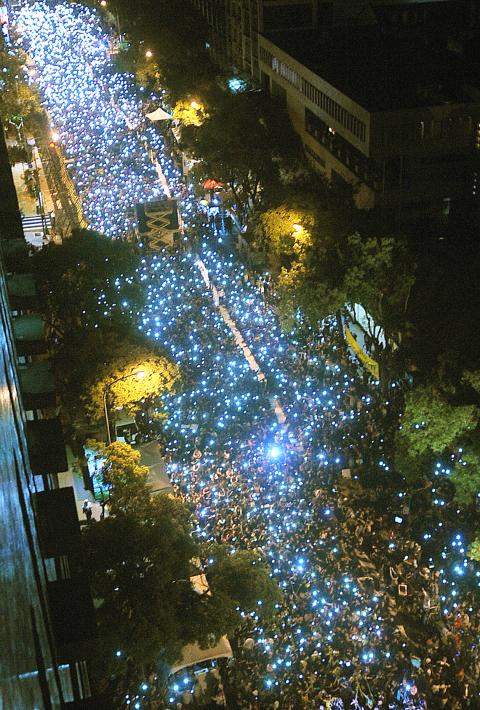
Photo: Fang Pin-chao, Taipei Times
The agency also dispatched police officers from the Special Police Sixth Headquarters to surround and take over the legislature.
The move has raised speculations that the government might be planning to take legal action against the students.
Additional reporting by Chen Hsiao-yi

Taiwan is projected to lose a working-age population of about 6.67 million people in two waves of retirement in the coming years, as the nation confronts accelerating demographic decline and a shortage of younger workers to take their place, the Ministry of the Interior said. Taiwan experienced its largest baby boom between 1958 and 1966, when the population grew by 3.78 million, followed by a second surge of 2.89 million between 1976 and 1982, ministry data showed. In 2023, the first of those baby boom generations — those born in the late 1950s and early 1960s — began to enter retirement, triggering

ECONOMIC BOOST: Should the more than 23 million people eligible for the NT$10,000 handouts spend them the same way as in 2023, GDP could rise 0.5 percent, an official said Universal cash handouts of NT$10,000 (US$330) are to be disbursed late next month at the earliest — including to permanent residents and foreign residents married to Taiwanese — pending legislative approval, the Ministry of Finance said yesterday. The Executive Yuan yesterday approved the Special Act for Strengthening Economic, Social and National Security Resilience in Response to International Circumstances (因應國際情勢強化經濟社會及民生國安韌性特別條例). The NT$550 billion special budget includes NT$236 billion for the cash handouts, plus an additional NT$20 billion set aside as reserve funds, expected to be used to support industries. Handouts might begin one month after the bill is promulgated and would be completed within

NO CHANGE: The TRA makes clear that the US does not consider the status of Taiwan to have been determined by WWII-era documents, a former AIT deputy director said The American Institute in Taiwan’s (AIT) comments that World War-II era documents do not determine Taiwan’s political status accurately conveyed the US’ stance, the US Department of State said. An AIT spokesperson on Saturday said that a Chinese official mischaracterized World War II-era documents as stating that Taiwan was ceded to the China. The remarks from the US’ de facto embassy in Taiwan drew criticism from the Ma Ying-jeou Foundation, whose director said the comments put Taiwan in danger. The Chinese-language United Daily News yesterday reported that a US State Department spokesperson confirmed the AIT’s position. They added that the US would continue to

IMPORTANT BACKER: China seeks to expel US influence from the Indo-Pacific region and supplant Washington as the global leader, MAC Minister Chiu Chui-cheng said China is preparing for war to seize Taiwan, Mainland Affairs Council (MAC) Minister Chiu Chui-cheng (邱垂正) said in Washington on Friday, warning that Taiwan’s fall would trigger a regional “domino effect” endangering US security. In a speech titled “Maintaining the Peaceful and Stable Status Quo Across the Taiwan Strait is in Line with the Shared Interests of Taiwan and the United States,” Chiu said Taiwan’s strategic importance is “closely tied” to US interests. Geopolitically, Taiwan sits in a “core position” in the first island chain — an arc stretching from Japan, through Taiwan and the Philippines, to Borneo, which is shared by